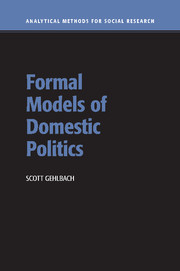3 - Special Interest Politics
Published online by Cambridge University Press: 05 March 2013
Summary
The models in the previous two chapters assume that voting in elections is the only avenue by which citizens may influence policy. Groups of individuals who have overcome their collective-action problems, however, may have other opportunities to exert influence. In this chapter, we examine various models of special interest politics, taking the organization of those interests as given. We first consider a model of pure campaign finance, where campaign spending is the only choice variable. We then explore the interaction between campaign finance and policy choice in a model of electoral competition. Both models simply assume that campaign spending influences voter behavior; we unpack this assumption in a model of informative advertising. We then move to an environment in which organized groups bargain with public officials over policy. We conclude by considering competition for influence in a lobbying model with several organized groups.
A Model of Pure Campaign Finance
We begin with a model of pure campaign finance. We abstract from the relationship between politicians and organized groups by assuming two parties, P = A, B, each of which chooses a campaign expenditure CP ∈ [0, ∞). Let π (CA, CB) denote the probability that party A wins, given campaign expenditures CA and CB; the probability that party B wins is therefore 1 − (CA, CB). We assume that π is weakly increasing in CA and weakly decreasing in CB. Each party receives a payoff from winning normalized to one, and each party P incurs a cost of raising campaign funds equal to γCP, where γ > 0.
- Type
- Chapter
- Information
- Formal Models of Domestic Politics , pp. 46 - 73Publisher: Cambridge University PressPrint publication year: 2013

